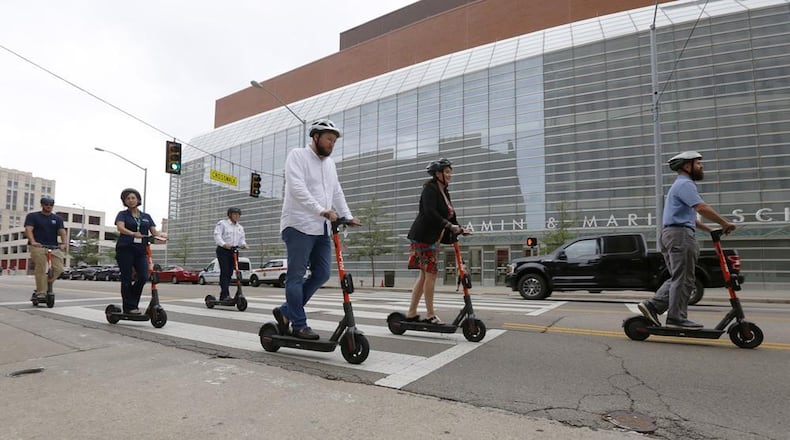Kettering’s moratorium was approved in February.
Oakwood’s legislation, which follows a moratorium approved last July, is necessary because Ohio “has not acted to clarify the law on these scooters,” City Councilman Rob Stephens said.
POPULAR: Historic downtown landmarks, businesses damaged in protest unrest
The vehicles pose “serious safety concerns” to both larger vehicle traffic and pedestrians, according to Oakwood’s proposal.
Violators of the ordinance – which Mayor Bill Duncan said will be voted on in July – would be considered a “public nuisance” and charged with a misdemeanor, records show.
Actions by various local jurisdictions notwithstanding, shared mobility devices “are largely unregulated,” Stephens said.
“Despite some level of public demand, they cannot be used legally on sidewalks due to their status as ‘motor vehicles’ under state law, nor can they be used legally on streets due to equipment limitations and the lack of adequate mechanisms for titling, registering, and insuring them,” Stephens added.
GEORGE FLOYD: Dayton area church leaders: Protestors’ voices not being heard
“As a result, there are several lawsuits pending around the nation,” he said.
In 2018, Columbus banned electronic scooters from its sidewalks. Dayton city commissioners last year imposed new rules on the vehicles and the companies that rent them out.
Late last year in California, the Beverly Hills City Council expanded its prohibition of certain shared mobility devices - including electric scooters - through January 2021.
And in February, Arlington County Virginia set limits on where e-scooters and e-bikes could operate.
EDUCATION: U.S. News ranks Ohio’s top high schools: See where area schools rank
Oakwood’s proposal defines the vehicles as “any wheeled device, other than an automobile or motorcycle, that is powered by a motor; is accessed via an on-demand portal, whether a smartphone application, membership card, or similar method; is operated by a private entity that owns, manages, and maintains devices for shared use by members of the public” at unstaffed, self-service locations.
“Until the (Ohio) General Assembly determines a path forward for our state, the problems inherent with shared mobility devices must be addressed by local government,” according to Oakwood’s legislation. “In cities where shared mobility devices are available, they are frequently abandoned by users in streets, sidewalks, and other public places, creating visual clutter and serious safety concerns, especially for the most vulnerable pedestrians.”
PUBLIC SAFETY: ODNR urges caution on water after 4 bodies found in apparent drownings
“Moreover, due to the spontaneous nature of these rentals and their appeal to young people, shared mobility devices are nearly always operated by users—often minors—without helmets,” it states.
Kettering’s moratorium was approved after similar public safety concerns, officials have said.
About the Author

